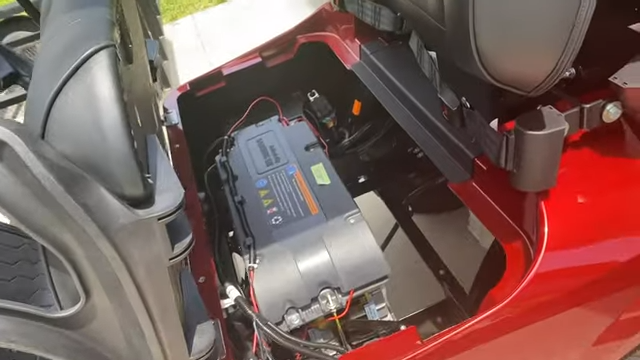How Long Do Lithium Golf Cart Batteries Last?
Like other regular batteries out there, lithium golf cart batteries must also be correctly recharged every now and then in order to keep going. But how often should you charge lithium golf cart batteries?
The answer to this question depends on a few factors, including how often you use your golf cart and what kind of charger you have. If you only use your golf cart occasionally, you can probably get away with charging the batteries every few months. However, if you use your golf cart regularly, you’ll need to charge the batteries more often – at least once a month.

If you are wondering when to charge your lithium batteries for golf carts, having a fast charger helps. You can charge your lithium golf cart batteries in as little as two hours. So if you’re short on time, there’s no need to worry – you can still charge your batteries quickly and easily.
So there you have it – a quick guide to how long does lithium battery last It’s essential to check your battery’s current condition and provide appropriate charging whenever needed. Your lithium golf cart batteries will last for many years with proper care.
Related Post: How Long Does It Take To Play Mini Golf
Things to Consider – How Often Should You Charge Lithium Golf Cart Batteries:
1) The Frequency of Use:
If you are wondering: Should you use golf cart batteries every day? Let us tell you. If you own a golf cart that runs on lithium batteries, you must understand how often you need to charge them. One of the things you need to consider is the frequency of use. If you only use your golf cart occasionally, you won’t need to charge the battery as often as someone who uses their golf cart daily. You can typically get away with charging the batteries once a month.
However, if you use your golf cart daily, you may need to charge the batteries more frequently. Not only does the frequency of use matter, but one should also consider the batteries’ age. Frequent battery usage makes them less efficient and tends to last shorter, requiring recurring charging. With this in mind, you get to prolong the average life of your lithium golf cart battery.
2) Type of Charger:
Not every charger is meant for every battery. Be sure that the charger you’re using is precisely compatible with the type of battery you have. You’ll need to make sure you have the correct type of charger. Lithium batteries require a different charger than lead-acid batteries, so be sure to use the correct one. It is ideal to charge lithium batteries at a lower voltage than lead-acid batteries.

It means that you’ll need to use a special lithium battery charger, which is designed to charge at a lower voltage. Finally, lithium batteries should be charged slowly and evenly, so choosing a charger with multiple settings is essential. Just be sure of these pointers and get your lithium golf cart batteries adequately charged and ready to go whenever you need them.
Related post: How to Get More Height on Driver?
3) The Condition of Lithium Battery:
Do you charge golf cart batteries every time and are wondering to find the answer that how long a 48v golf cart lasts? If your battery is damaged, it won’t charge properly (and could be unsafe). Make sure to inspect it before attempting to charge.
You need to ensure that your batteries are in good condition – if they’re damaged, they’re not going to charge appropriately. Next, you’ll want to pay attention to your charger’s voltage and amperage rating – if it’s too low, it won’t charge the battery fully; if it’s too high, it could damage the battery.
Overcharging can shorten their lifespan and cause them to become less effective. If they’re new, you’ll want to charge them slowly at first (known as conditioning), then increase the rate as they break in. If they’re older, you can go ahead and charge at full speed. If you want to optimize the charging of your lithium battery fully, charge it evenly at room temperature.
Depending on the battery’s size and the charger’s power, it can take anywhere from a few hours to a day or more to fully charge lithium. Don’t forget to follow the above key points while you carry out your battery charging schedule.
4) The Climate:
The climate is another thing to keep in mind when it comes to charging lithium golf cart batteries. Temperature can affect how quickly your battery charges. In low temperatures, the battery will take longer to charge; as a result, the discharge will be fast, and you’ll need to charge quite often.
In cold weather, the battery will discharge more slowly, so you won’t need to charge it as often. In cold climates, it’s vital to ensure the batteries are kept warm, preferably at room temperature. Also, follow up on the voltage level. Once the voltage drops below a certain point, the lithium battery will ask for a recharge more often.
5) Storage:
Storage is another thing to remember when charging lithium golf cart batteries. If you’re not going to use the golf cart for an extended period, it’s important to store the batteries properly.
Store the lithium battery in a cool, dry place. Also, checking whether the batteries are fully charged before you put them in storage is crucial. This will help prevent them from self-discharging and becoming damaged.
By following these simple headers, you can help ensure that your lithium batteries will be ready to go when you need them.
Lithium Golf Cart Batteries Charging Tips:
1) Overcharge is slow poison:
The worst you can do with your best lithium golf cart batteries is to overcharge them. Overcharging will affect the lifespan of the battery. In addition, overcharging can cause the batteries to self-discharge and become less effective.
2) Don’t Charge in Direct Sunlight:
Another pointer is to avoid charging lithium golf cart batteries in direct sunlight. This can damage the batteries and cause them to become less effective.
3) Charging in Extreme Cold or Heat:
Weather plays its part when it comes to charging. Charging lithium golf cart batteries in extreme cold or heat might damage the internals of the battery. As a result, your battery might start to self-discharge or gradually move towards becoming less effective with each passing day.
4) Using the Wrong Charger:
Using the wrong charger could prove to be quite hazardous. Some chargers are mainly designed for lead-acid batteries. If those charged are plugged into lithium batteries, they might cause a great deal of damage to lithium batteries. In addition, using the wrong charger can cause the batteries to overcharge and self-discharge.

5) Deviation from Manufacturer’s Instructions:
Finally, it’s essential to carefully follow the guidelines from manufacturers while you charge your lithium batteries, as overcharging can damage the batteries and make them less durable. Moreover, if you don’t follow the manufacturer’s instructions properly, you might also void your warranty.
Conclusion:
Drop-in Lithium golf cart batteries are an excellent choice for those who need a reliable and long-lasting power source. However, you will find the answer to the question of how often should you charge lithium golf cart batteries by acting on a few tips while charging is vital for the long life of the lithium battery. By following the simple tips outlined above, you can help ensure that your lithium batteries will provide years of reliable service.

First of all I would like to say wonderful blog!
I had a quick question in which I’d like to ask if
you do not mind. I was interested to find out how you center yourself and clear your
thoughts prior to writing. Ihave had a tough time clearing my mind in getting myy thoughts
out. I do take pleasure in writing but it just seems
like the firsdt 10 to 15 minutes are wasted simply jjust trying to figure out how to begin. Any suggestions or hints?
Appreciate it!
Have a look at my weeb blog ::Melba
Muchos Gracias for your blog post.Thanks Again. Great.